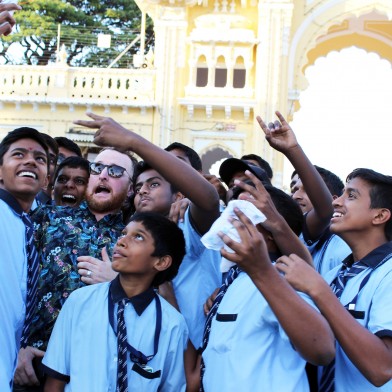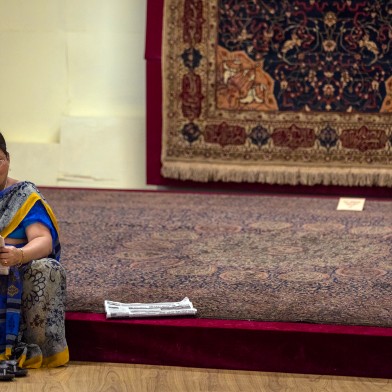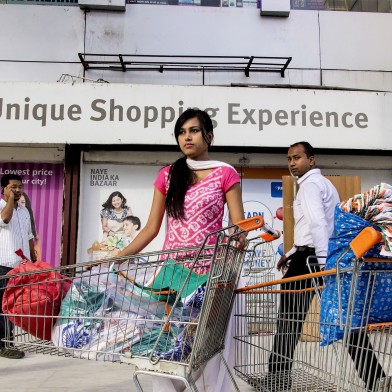In February, a New Zealand business delegation travelled to India with ministers Winston Peters and David Parker on a trade mission. In the delegation was Anna Campbell, managing director of AbacusBio, a Dunedin-based agri-technology company. In this Q&A, she answers the Asia Media Centre's questions about the visit and AbacusBio's work in the country.
What were the most essential takeaways for you from the recent trip?
Firstly, New Zealand desperately needs to do more to diversify our export markets.
I am in the agri-sector and I have heard of many agricultural companies, exporting New Zealand food products, being reliant on the Chinese market anywhere from 40 to 95 percent of their export basket.
COVID-19 is a massive reminder to us that we need to be in many markets – as businesses, we often tend to be too focused on the short-term and immediate shareholder returns which leave us vulnerable to crises. In saying that, I also run a business and understand the costs of developing new markets – it is a balancing act and I think that the private and public sectors should do more together to overcome such challenges.
With respect to India, nothing beats being in-market and on this delegation, I was reminded what a wonderfully colourful, complex and chaotic country India is.
 In India, Anna Campbell found a colourful, complex country grappling with its own growth. Photo: Anna Campbell/Supplied
In India, Anna Campbell found a colourful, complex country grappling with its own growth. Photo: Anna Campbell/Supplied
In-terms of hard facts, the average age of an Indian living in India is 29 and that average won’t increase until 2042. India grows in size by New Zealand’s population every year. In a country of 1.3 billion people, the Government has in the past few years rolled out the biggest biometric ID system in the world – prior to this, 4/10 births went unregistered. India averages annual GDP growth of 7.5 percent and is expected to grow from a market size of US$2.8 trillion to US$18 trillion during my lifetime.
For many years, the New Zealand Government has strived to achieve a Free Trade Agreement with India – the blockage to success being dairy.
India is the largest producer and consumer of dairy products. New Zealand produces a fraction of what India produces, yet New Zealand and Fonterra are seen as dairy “giants”. Because of that there is a belief that an FTA between our countries will mean that we will flood the Indian market with our milk products and Indian farmers will suffer.
Farmers in India generally don’t own land.
They are the poorest of the poor working the land for a pittance, yet because of their numbers they hold tremendous voting power. Rural India makes up greater than 50 percent of India’s population and India is the world’s largest democracy. In a democracy every vote counts. On top of that, political changes which hurt rural India send migrants in droves to the cities, where they create more slums and headaches for the government.
The take-home message for New Zealand: don’t hold your breath for a free trade agreement with India which includes dairy. And the take home message for our traditional agricultural exporters: don’t come here unless you can survive paying tariffs of over 30 percent.
Your company – Abacusbio – is involved in Bihar state working in animal genetics and livestock breeding , can you give us some details on what you are actually doing?
AbacusBio has been working in the Bihar region of India for a few years now, led by Dr Peter Amer and in collaboration with Dr Chanda Nimbkar from the Nimbkar Agricultural Research Institute and with the Aga Khan Foundation. The project is funded by the Bill and Melinda Gates Foundation and aims to empower rural women to improve the health, management and genetics of their goats.
AbacusBio’s software product, Dtreo is being used for data capture and analytics and the whole programme is starting to make real impact in terms of nutritional and commercial returns for families.
Indian women care and nurture the goats which they can then sell or breed. As highlighted by Bill Gates “The money women earn from their goats stays in their hands, with more control of their finances, women improve their status within the home. They also have greater ability to make their own decisions, - and have greater power over their own lives."'
 AbacusBio's work in the Bihar region focuses on rural Indian women. Photo: Anna Campbell/Supplied
AbacusBio's work in the Bihar region focuses on rural Indian women. Photo: Anna Campbell/Supplied
Studies have proven that women when in possession of cash will spend it on beneficial products and services that improve the quality of life such as education, nutrition and health.
In the future AbacusBio are hoping to expand and advance these community based breeding programmes (CBBPs) across India.
Ideally the knowledge will naturally flow between villages and communities, the Pashu Sakhis educating others to expand the knowledge. The presence of Dtreo software supports an effective scale up of CBBPs to the point of having national level impact. As global citizens, we have a mission focused vision of using genetics and innovative technology to successfully secure the world’s food supply.
How is this project funded, and are you planning to expand or develop these community-based programmes across India?
Mostly answered above, but worth noting that in a different project we are undertaking in Uganda, we are partnering with a local commercial company who will continue driving the project beyond development money. We want to do the same in India, whether that be working with commercial companies or local government to ensure sustainability of the impacts we are making last beyond the life of the Gates investment.
Are there genetic components being sourced from NZ for the project? Is that a possibility?
This is a possibility but generally we would prefer to have the main source of genetics as local. Local genetics are better adapted to local environments – climactically, disease-wise and in terms of local people’s preferences for the taste of end products.
If we were to bring in New Zealand genetics it would be for cross-breeding purposes and we would envisage the main base genetics always being predominantly local. There are other technologies from New Zealand that we may look to integrate, such as weighing systems from Datamars or Gallaghers – this would all be driven by what is best for the local people in terms of any solution.
Are Indian rural communities familiar with this kind of stock improvement technology and what new aspects are being shown to them?
Breeding and genetic improvement is a long-art, the real difference with what we are bringing is the analytical approach.
Interestingly, just by collecting data for genetic improvement the local people have been able to improve goat management as well, for example disease management. Data is power and when the local people drive the collection and understanding of how to use that data, that's really where the rubber hits the road in terms of progress.
 Anna Campbell is managing director of AbacusBio, a Dunedin-based agri-technology company. Photo: AbacusBio/Supplied
Anna Campbell is managing director of AbacusBio, a Dunedin-based agri-technology company. Photo: AbacusBio/Supplied
You have also been to Sri Lanka to look at plant medicine technology - is that something Abacusbio is looking to move into?
My PhD was in plant breeding and genetics and I have long held a passion for the field of plant bioactives and their potential role in our food system. AbacusBio merged with a plant breeding company, Gemnetics, last year to give us greater plant breeding capability. We are also working extensively in African countries around rice, cassava and sweet potato breeding programmes, so medicinal plants is not as big a leap as it may seem.
We are working with a Sri Lankan based company, Lanka Salads, who produce leafy greens for the Sri Lankan market and potentially to export to India and other parts of Asia.
We are exploring how to add value to their salad offering with locally grown Sri Lankan plants which have been used for traditional medicine, but also have good modern scientific data supporting their use. I am really excited by this project, although it’s early days – the opportunity for agricultural companies to move into the well-being market is huge and like our approach in India, the best way to do this is to work with local companies to add value to their businesses.
More generally, how do you think New Zealand companies should be approach gaining access to the Indian market?
The Indian market is complex, 29 states are like 29 different countries within a country.
What came out loud and clear during the delegation was that New Zealand should not think of India as China 2.0. We need to think carefully about how we support businesses into this market, because in general the cost of sales will be high and its not likely to be commodity-style food products that will do well because of tariffs. I think service based companies are a great lead into the market.
There is a good interview with McKinsey Global Institute partner Susan Lund, an expert in globalisation, here is an excerpt:
“After the global financial crisis of the mid-2000s, trade flows plunged in 2008, 2009. A lot of us thought, “Well, when the recovery gets going in the US and Europe, then trade will ‘go back to normal.’” Now we’re ten years out from that point, and we can look back and see, in fact, we’re in a very different chapter of globalization.
"The trade intensity of manufactured goods is going down. That means more goods that are produced are now sold in the country they’re produced in. They’re not traded or exported and imported. But at the same time, we see services trade continues to grow much faster than goods trade. So, increasingly, globalization is about trade in various forms of services, like IT services and telecommunications, transportation, business services, and these types of things.”
Anna Campbell pictured in India. Photo: Supplied
This statement in the context of what we are seeing with COVID-19 right now, really rings true. Protectionism won’t go away and FTAs are unlikely, so we need to work to a strategy that allows us to succeed in such an environment.
There are good news stories. New Zealand food companies paving the way in India include a young company, QualityNZ distributing New Zealand lamb, seafood and other products into 5-star hotels and into first-class airline cabins.
There are also New Zealand technology and service companies gliding under the tariff barriers, such as Valocity Global and ReDesign. Ultimately, technology, education and high-end food offer our best export path into this economy, especially in the short term.
Did you see any specific business opportunities that could be picked up by NZ companies, either in agri-science or elsewhere?
In addition to above, regards services, food security is a huge challenge for India. How do they feed their growing population with fewer resources? How do they do this while still enabling their local smallholder farmers?
New Zealand needs to be operating in this space – I am biased as this is our area of interest, but we are one small company. Imagine what we could do if New Zealand companies and the New Zealand Government banded together in India to really create impact and long term partnerships to underpin the export market.
If we are serious about India as a market, we do need to move and to move quickly. On the delegation it was pointed out that Aussie Ministers had been in-market five times in the past year whereas our ministerial visit was the first one in two years. These things do matter and we need to be strategic – again, India will not be China 2.0!
- Asia Media Centre


